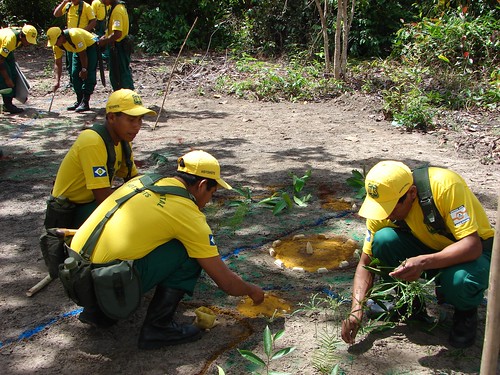
Since 1991, the U.S. Forest Service has worked to develop a program focusing on improving sustainable forest management and administration, fire management and prevention and special uses in protected areas in Brazil. The emphasis has been on exchanging experiences with a focus on critical issues such as curbing illegal logging and preserving public forests.
The Forest Service’s International Programs and support from the U.S. Agency for International Development (USAID), has generated a partnership with Alianca da Terra, a Brazilian non-governmental organization that works with ranchers and farmers to get their goods to market in a sustainable way. They also help landowners preserve forestland. The current law requires maintaining 80 percent of forestland. While this seems straightforward, the reality on the ground is complex.
Alianca da Terra is challenged by squatters who use fire to clear land for crops. Doing so threatens the forest. For the past two years, smoke jumpers and fire managers from the U.S. Forest Service have been working with Brazilian representatives to improve understanding of fire management and build leadership within local fire brigades.

Practices are improving partly due to training of more than 250 indigenous leaders and community members in basic fire prevention, management and safety in the last two years. Smoke jumpers and fire management officers sent from the U.S. Forest Service to Brazil have been able to build local capacity to combat fires safely and effectively as well as build leadership within local fire brigades.
Recently, representatives from the Payette National Forest trained over 80 community and fire brigade members. As a result, the landholders and tribes in Mato Grosso are better prepared to control, manage and prevent fires from destroying farms, ranches, and the remaining tropical Amazon forests in the region. The work preserves livelihoods and conserves biodiversity and tropical forests.
Continued work with the fire brigades will evaluate their methods, actions and offer recommendations for improving their firefighting skills. The program will continue to build and support leadership in the fire community.
